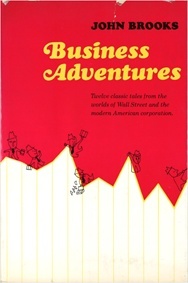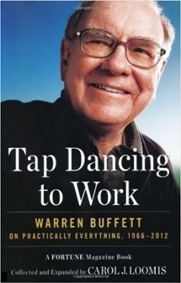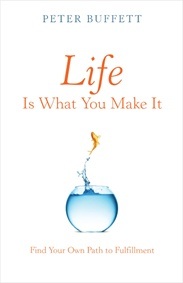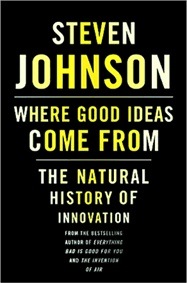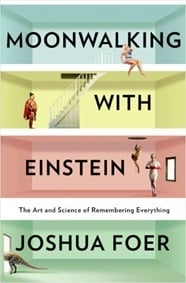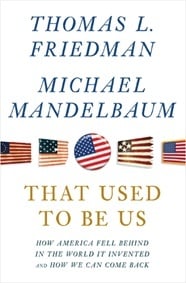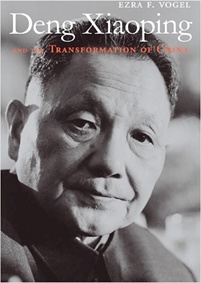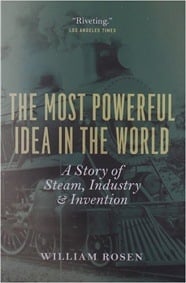Ever heard the quote “learners are earners”? Bill Gates certainly has. He strives to read a book a week. No one is questioning his ability to earn! Luckily, you can follow his lead by following his blog, Gates Notes. He posts his thoughts on the books he reads so anyone can get into his mind and understand his views on success. Read on. Lead on.
1. Business Adventures by John Brooks
To have great success, it is important to understand why businesses are successful and why they fail. This book dives into the deep inner workings of why on both sides.
What the publisher says about it: “From Wall Street to Main Street, John Brooks, longtime contributor to the New Yorker, brings to life in vivid fashion twelve classic and timeless tales of corporate and financial life in America.”
What Bill Gates wrote about it:
“Today, more than two decades after Warren lent it to me–and more than four decades after it was first published–Business Adventures remains the best business book I’ve ever read. John Brooks is still my favorite business writer.”
Actually, this book was so important to Bill Gates that he made a short video about it. In it, he interviews Warren Buffet and other high-profile business leaders. Read Gates’ review and watch the video here.
Buy the best business book Bill Gates has ever read.
2. Tap Dancing to Work by Carol Loomis
It’s no secret that Bill Gates and Warren Buffett have a strong relationship. This book is a compilation of Buffett’s articles interwoven by his colleague and close friend, Carol Loomis. If you want to learn about the unfolding of great success, this one is for you.
What the publisher says about it: “Warren Buffett built Berkshire Hathaway into something remarkable–and Fortune journalist Carol Loomis had a front-row seat for it all.”
What Bill Gates wrote about it:
“I think anyone who reads it cover to cover will come away with two reactions: First, how Warren’s been incredibly consistent in applying his vision and investment principles over the duration of his career; and, secondly, that his analysis and understanding of business and markets remains unparalleled.”
Buy the book that gets inside the mind of Bill Gates’ mentor.
3. Life is What You Make It by Peter Buffett
Peter Buffett has been successful in his life too, although not completely because of his wealthy, successful father. This book tells the story of a hard-working wealthy child, and what his father instilled in him to become successful in music and philanthropy. Bill Gates said he will be reading it with his older children. You don’t have to be the child of a wealthy man to get this wisdom and enjoy your path.
What the publisher says about it: “From composer, musician, and philanthropist Peter Buffett comes a warm, wise, and inspirational book that asks, Which will you choose: the path of least resistance or the path of potentially greatest satisfaction?”
What Bill Gates says about it:
“Contrary to what many people might assume, Peter won’t inherit great wealth from his father. Instead, he was encouraged by his parents to find his own path. The book is a chronicle of that journey–and the wisdom and perceptions he has developed along the way.”
Get the book that Bill Gates wants for his children.
4. Awakening Joy by James Baraz
Why do you want to be successful? Joy may be a reason. This book teaches you how to have joy while you are becoming successful.
What the publisher says about it: “Awakening Joy is more than just another book about happiness. More than simply offering suggested strategies to change our behavior, it uses time-tested practices to train the mind to learn new ways of thinking.
The principles of the course are universal, although much of the material includes Buddhist philosophy drawn from the author’s thirty years as a Buddhist meditation teacher and spiritual counselor.”
What Bill Gates says about it:
“Joy is not for just the lucky few–it’s a choice anyone can make. In this groundbreaking book, based on his popular course, James Baraz helps you discover a path to the happiness that’s right in front of you, offering a step-by-step program that will reorient your mind away from dissatisfaction and distraction and toward the contentment and delight that is abundantly available in our everyday lives.”
Get the book so you can successfully have what Bill Gates has: joy.
5. Where Good Ideas Come From by Steven Johnson
Being successful requires a certain amount of innovation. This buzzword does not spark a strong visual for many people. Where Good Ideas Come From defines what makes fertile ground for successful innovation.
What the publisher says about the book: “The printing press, the pencil, the flush toilet, the battery–these are all great ideas. But where do they come from? What kind of environment breeds them? What sparks the flash of brilliance? How do we generate the breakthrough technologies that push forward our lives, our society, our culture? Steven Johnson’s answers are revelatory as he identifies the seven key patterns behind genuine innovation, and traces them across time and disciplines.”
What Bill Gates wrote about it:
“Especially for people in business or education, it’s a worthwhile book. It talks about the institutional structures that facilitate good ideas–how you get lots of people thinking about cutting edge problems, how you put people together in a space where different skill sets and influences can come together, how you make the right kinds of materials available but don’t force a conclusion.”
Get the book that Bill Gates says successful educators and businesspeople need for great innovation.
6. Moonwalking with Einstein by Joshua Foer
You can’t be successful if you are known as forgetful. This book can teach you how to memorize obscure facts and useful ones. Great for those of us who are bad with names.
What the publisher says about it: “Moonwalking with Einstein recounts Joshua Foer’s yearlong quest to improve his memory under the tutelage of top ‘mental athletes.’ He draws on cutting-edge research, a surprising cultural history of remembering, and venerable tricks of the mentalist’s trade to transform our understanding of human memory.”
What Bill Gates says about it:
“Like most people, I’m fascinated by how the mind works, and memory is a big element of that. Part of the beauty of this book is that it makes clear how memory and understanding are not two different things. Building up the ability to reason and the ability to retain information go hand in hand.”
Get the book that makes Bill Gates’ mind work out hard.
7. Academically Adrift: Limited Learning on College Campuses by Richard Arum and Josipa Roksa
This book outright says what we have all suspected: our college education may not have emphasized learning as much as we believed. This book can make you successful for two reasons:
1. You can put your college education in a mental box and give yourself permission to learn in the real world.
2. If you are an educator, there is a real need for successful innovation.
What the publisher says about this book: “In spite of soaring tuition costs, more and more students go to college every year. A bachelor’s degree is now required for entry into a growing number of professions. And some parents begin planning for the expense of sending their kids to college when they’re born.”
What Bill Gates says about it:
“The dismal results presented in Academically Adrift are based on the Collegiate Learning Assessment, a standardized test in which students are asked to make a practical decision–such as, what kind of airplane a company should buy–and explain their choice based on a set of goals and facts about different options. I’m optimistic about the potential of innovation to help solve many of the problems with our post-secondary system. But we need more and better information.”
Bill Gates is lobbing this innovation softball at you. Will you take it and become successful?
8. That Used to be Us: How America Fell Behind in the World It Invented and How We Can Come Back by Thomas L. Freidman and Michael Mandelbaum
Thinking that the US is going to hell in a handbasket creates a dismal picture of the world. Dismal pictures dampen a person’s ability to be successful. Some aspects are true: America is not growing as fast as other countries; we are falling behind in math and science and sometimes even business. It’s not actually horrifying; we have just been really amazing at inspiring other countries to be like us. And now it’s time for the US to take the next step and lead the world.
What the publisher says about the book: “In That Used to Be Us, Thomas L. Friedman and Michael Mandelbaum analyze the four major challenges we face as a country–globalization, the revolution in information technology, chronic deficits, and our pattern of energy consumption–and spell out what we need to do now to preserve American power in the world.”
What Bill Gates wrote about the book:
“That Used to Be Us is a fantastic book, and I really encourage people to read it.
The basic message is that other countries, the ones that are now competing with us and kind of scaring us, are not doing anything different from what we did in our past. We have a difficult time responding to them, however, because they’re copying the way we used to be, and meanwhile, we’ve changed. As our society has gotten richer, we’ve become more careful about protecting people’s rights and not harming the environment, for example.”
Get the book that can position you to change the world.
9. Deng Xiaoping by Ezra F Vogel
Being successful requires taking a tough situation and transforming it into a beautiful piece of art. That’s what Deng Xiaoping did with the most populous country in the world. Before he came into power, China was in poverty and was unable to pull itself out. Deng transformed China’s business practices and and improved the country’s economy.
What the publisher says about it: “No one in the twentieth century had a greater impact on world history than Deng Xiaoping. And no scholar is better qualified than Ezra Vogel to disentangle the contradictions embodied in the life and legacy of China’s boldest strategist–the pragmatic, disciplined force behind China’s radical economic, technological, and social transformation.”
What Bill Gates wrote about it:
“China in 1979 was one of the poorest countries in the world, far poorer than India. They were barely scratching out a living and their population density made it difficult for them to feed their population. There was very little to build on other than the fact that the party had incredible authority.
With this authority, Deng set in motion a series of critical changes early on in his leadership to achieve cultural stability and significant economic growth. To have done this essentially in one generation is an unbelievable accomplishment and is unique in the history of the world.”
Get the fascinating book about one man who inspired a whole country to become successful.
10. The Most Powerful Idea in the World by William Rosen
At first glance, it looks like this book is about railroads and engines. That’s plenty cool if you’re into that kind of stuff. The real meaning is about why these machines were so successful. What was the idea that made railroads so capable of changing the world?
Here’s what the publisher said about it: “Hardly a week passes without some high-profile court case that features intellectual property at its center. But how did the belief that one could own an idea come about? And how did that belief change the way humankind lives and works?”
What Bill Gates wrote about the book:
“The book’s premise is that the Anglophone world–England, Scotland, Wales and America–was the epicenter of the Industrial Revolution because it ‘democratized the nature of invention.’ Rosen makes a compelling argument that the steam engine is the quintessential example of that democratization at work.
Rosen’s view fits my own view of the power of measurement to advance the work of our foundation. (I focused my 2013 Annual Letter from the foundation on measurement and the amazing things you can accomplish in global health, education and other areas if you set clear goals and can measure your progress toward them.)”
Get the book that can change the way you invent new ides so you can become successful.
Featured photo credit: Thomas Hawk via compfight.com

